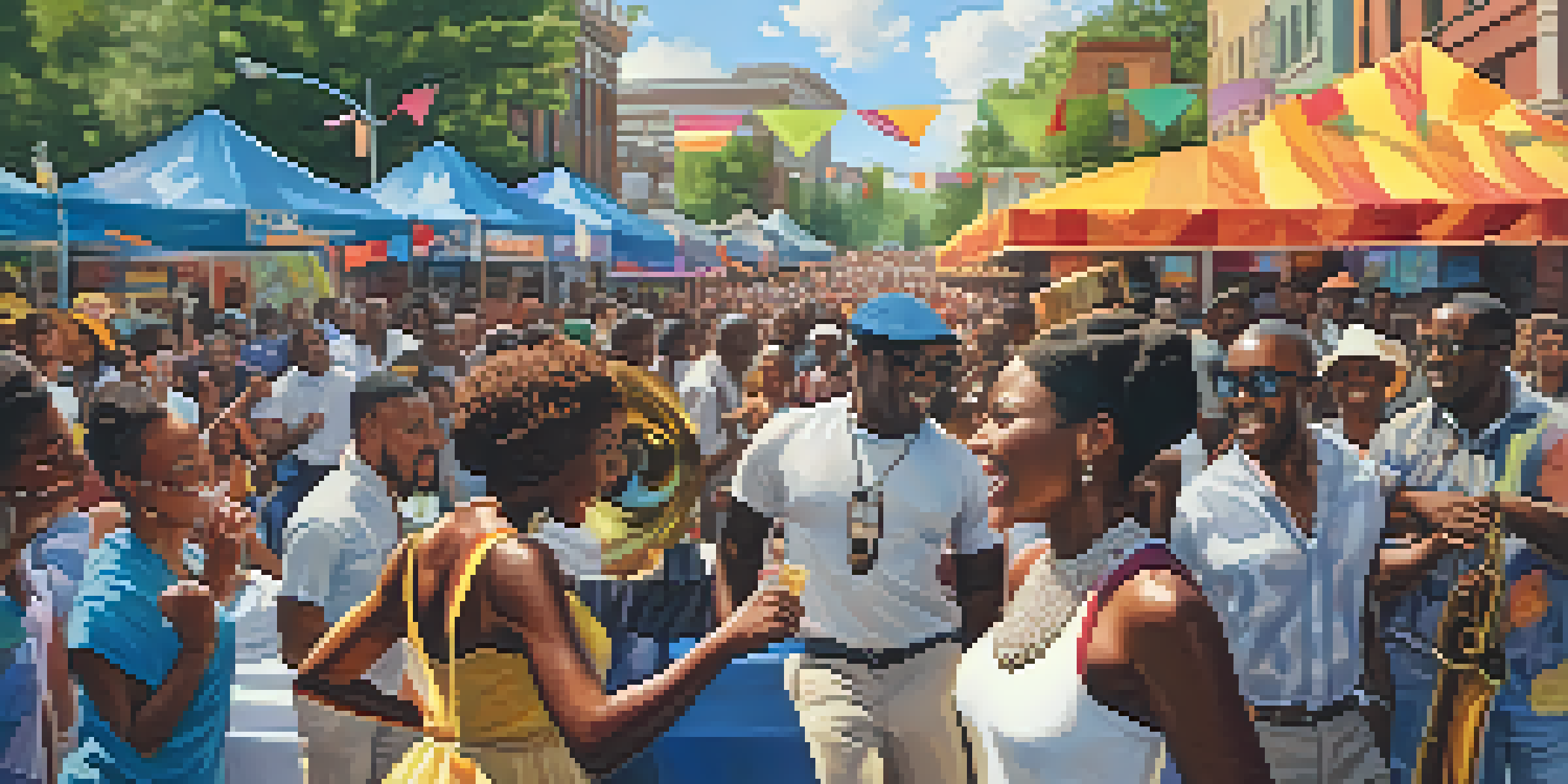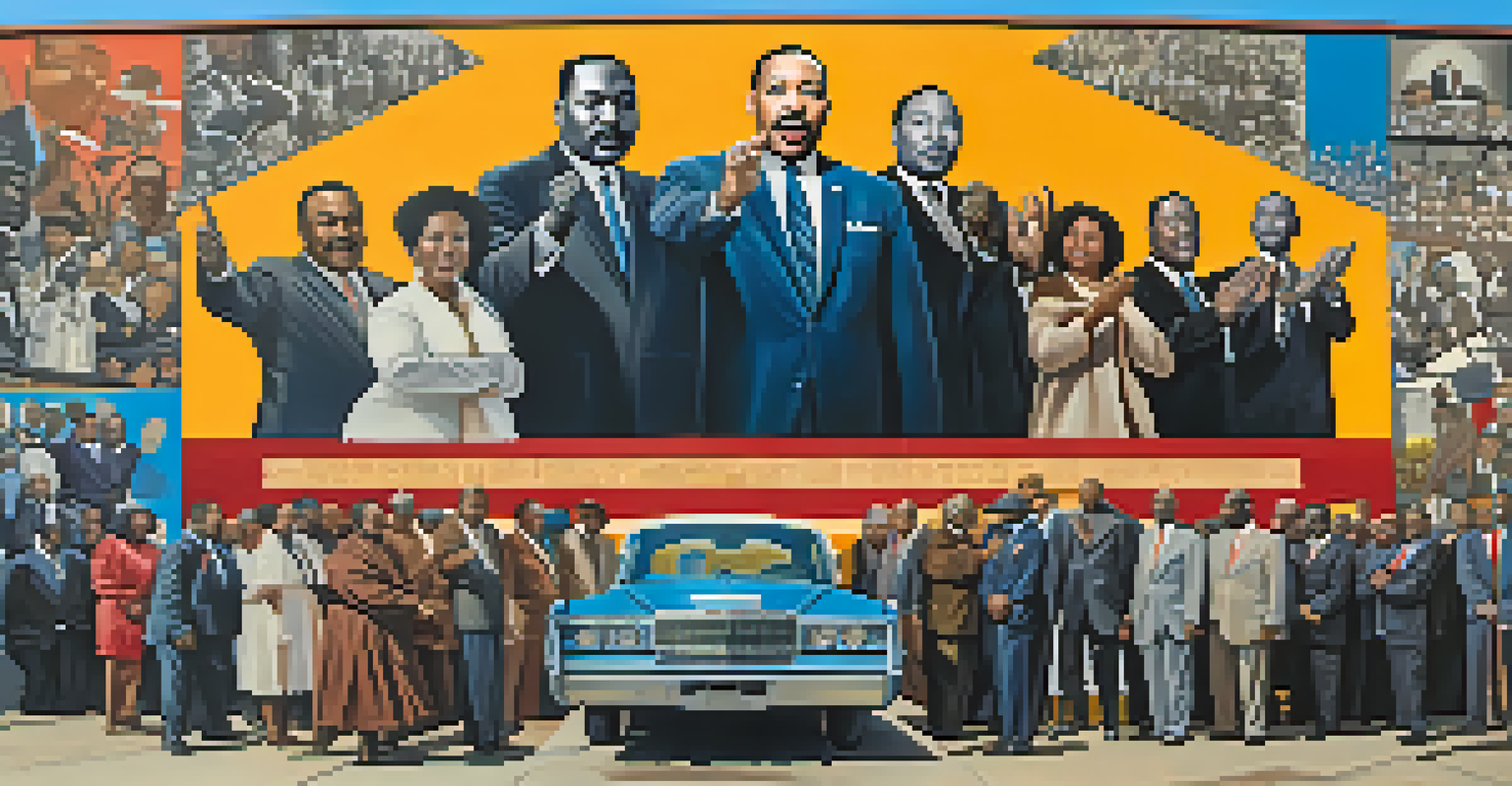The Influence of African American Culture on Atlanta's Heritage

The Roots of African American Culture in Atlanta
Atlanta's history is deeply intertwined with the African American experience, beginning with the arrival of enslaved Africans in the 18th century. These early communities laid the groundwork for a vibrant culture that would flourish despite immense hardships. The resilience and creativity of these individuals gave rise to rich traditions in music, art, and cuisine that still resonate today.
Injustice anywhere is a threat to justice everywhere.
The establishment of significant institutions, like the Atlanta University Center, further solidified the African American community's role in shaping the city's culture. This hub of education fostered leaders who would champion civil rights and cultural movements, impacting not just Atlanta but the entire nation. Through their efforts, the cultural identity of African Americans became a crucial thread in Atlanta's fabric.
As we look back at Atlanta's past, it's clear that the African American narrative is not just a part of history; it is a defining element of what makes Atlanta unique. From storytelling traditions passed down through generations to the continuing influence on contemporary culture, these roots remain vital to the city's identity.
Music: The Heartbeat of Atlanta's Culture
Music is a powerful expression of culture, and in Atlanta, it serves as a heartbeat that pulses through the city. The influence of African American musicians can be seen in the rise of genres like hip-hop, R&B, and soul, which have all played a significant role in shaping Atlanta's cultural landscape. Artists such as OutKast and Usher not only put Atlanta on the musical map but also brought unique narratives that reflect the experiences of the African American community.

Atlanta's vibrant music scene is not just about famous artists; it also thrives on local talent and grassroots movements. Venues like the Historic Fox Theatre and the Tabernacle host performances that highlight the rich musical heritage of the city. Additionally, music festivals such as A3C celebrate the diversity and innovation of Atlanta's music culture, further showcasing the influence of African American artists.
Cultural Roots Shape Atlanta's Identity
The African American experience is a defining element of Atlanta's culture, influencing music, art, and cuisine.
The impact of music transcends entertainment; it serves as a vehicle for social change and community empowerment. Through music, many African American artists have addressed issues of inequality, injustice, and resilience, creating a soundtrack for movements that have echoed throughout history and continue to resonate today.
Culinary Traditions: Flavoring Atlanta's Identity
Food is an essential part of culture, and in Atlanta, the culinary scene is heavily influenced by African American traditions. Southern cuisine, with its roots in African cooking methods and ingredients, has become a staple in Atlanta's dining establishments. Dishes like fried chicken, collard greens, and cornbread tell a story of heritage, resilience, and creativity.
The soul of America is in the music of its people.
The rise of soul food restaurants and food festivals in Atlanta has highlighted the importance of these culinary traditions. Chefs and home cooks alike continue to innovate while honoring classic recipes passed down through generations. This blend of tradition and innovation creates a culinary landscape that is distinctly Atlanta, attracting food lovers from all backgrounds.
Moreover, the celebration of African American culinary arts fosters community and connection. Events such as the Atlanta Food & Wine Festival spotlight the contributions of African American chefs, ensuring that their stories and flavors are recognized and celebrated. In this way, food serves as a bridge connecting the past with the present, enriching Atlanta's cultural heritage.
Art and Literature: A Reflection of Identity
Art and literature have always been powerful mediums for expressing cultural identity, and Atlanta is no exception. African American artists and writers have used their craft to reflect the struggles, joys, and complexities of their experiences. From the Harlem Renaissance to contemporary art movements, Atlanta has been a pivotal location for African American creativity.
Institutions like the High Museum of Art and the Center for Civil and Human Rights feature works that highlight the contributions of African American artists. These spaces not only showcase their talent but also educate the public about the history and significance of their struggles and achievements. Exhibitions often provoke thought and dialogue around race, identity, and culture.
Music as a Medium for Change
Atlanta's rich music scene, driven by African American artists, serves as both a creative outlet and a platform for social change.
Moreover, Atlanta's literary scene thrives with voices that challenge narratives and inspire change. Writers such as Alice Walker and James Baldwin have roots in Atlanta, and their works continue to influence new generations of authors and poets. Through their stories, they capture the essence of the African American experience, ensuring that these narratives remain a vital part of Atlanta's cultural heritage.
Civil Rights Movement: A Legacy of Change
Atlanta played a crucial role in the Civil Rights Movement, serving as a battleground for social justice. The contributions of African American leaders, such as Dr. Martin Luther King Jr. and Andrew Young, were instrumental in advancing the cause of equality. Their efforts not only transformed Atlanta but also inspired a nationwide movement that sought to dismantle systemic racism.
Historic sites like the Martin Luther King Jr. National Historical Park serve as reminders of this significant period in American history. Visitors can explore the legacy of the Civil Rights Movement and reflect on the sacrifices made by countless individuals. These sites highlight the importance of activism and community engagement in shaping the future.
The impact of the Civil Rights Movement continues to be felt in Atlanta today, as the city stands as a beacon of hope and resilience. The lessons learned from this era guide ongoing discussions about racial justice and equality, emphasizing the ongoing need for advocacy and awareness within the community.
Festivals and Celebrations: Honoring Heritage
Festivals and cultural celebrations are vital for honoring and preserving African American heritage in Atlanta. Events such as the Atlanta Black Pride Festival and the Atlanta Jazz Festival bring communities together to celebrate identity, creativity, and resilience. These gatherings showcase the rich tapestry of African American culture and provide a platform for artists, musicians, and performers to share their talents.
Moreover, these festivals play an essential role in fostering community connections and solidarity. They create spaces where people can share their stories, traditions, and experiences, strengthening the bonds that unite various cultural groups within Atlanta. The vibrancy of these events reflects the city's commitment to inclusivity and diversity.
Festivals Celebrate African Heritage
Cultural festivals in Atlanta foster community bonds and highlight the significance of African American traditions.
In addition to entertainment, these celebrations often serve as opportunities for education and awareness. Workshops and discussions during festivals provide insights into the history and significance of African American culture, ensuring that future generations understand and appreciate their heritage. Through these efforts, Atlanta continues to celebrate its rich cultural legacy.
The Future of African American Culture in Atlanta
As Atlanta continues to evolve, the influence of African American culture remains a cornerstone of its identity. The city's dynamic environment fosters creativity and innovation, allowing for new expressions of culture to emerge. Young artists, musicians, and entrepreneurs are carrying the torch, ensuring that the legacy of their predecessors lives on.
Community initiatives and organizations play a crucial role in nurturing this cultural growth. By supporting local talent and providing resources for artistic expression, they create pathways for future generations to engage with their heritage. This commitment to cultural preservation and innovation is vital in maintaining the vibrancy of Atlanta's cultural landscape.

Looking ahead, it's clear that African American culture will continue to shape Atlanta's narrative. As new stories are told and new traditions emerge, the city will remain a testament to the resilience, creativity, and strength of its African American community, enriching the lives of all who call Atlanta home.